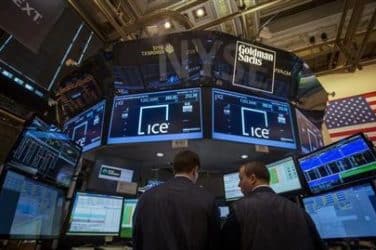Happy New Year! 2020 welcomes in a new decade and I hope it brings you all peace, happiness and good health.
We bid farewell to the many twists and turns of 2019, some that caused us anxiety, some that brought new opportunities and excitement.
What does 2020 and the next #decade hold? What does Hong Kong’s future look like, and can #HongKong maintain and strengthen its international relevance? HKEX Chief Executive Charles Li discusses in his latest blog. More: https://t.co/On4RPXndKm pic.twitter.com/HUcCo3kijw
— HKEX 香港交易所 (@HKEXGroup) January 6, 2020
What does 2020 and the next decade hold? How will geopolitics, global economics and technological innovations impact our lives? More importantly for us, what does Hong Kong’s future look like, and for our own global markets? Can Hong Kong maintain and strengthen its international relevance? As we stand at the crossroads of two decades, I am looking forward, hoping to see the future with clarity, with 2020 vision.
Decade in Review
The past decade was full of both progress and contradictions; of global economic and technological innovations; and of deepening political and social divisions.
Globalisation spread at an unprecedented rate, though as we sit here there appears to be a reversal in that trend. And, China and the U.S. celebrated more than two decades of marriage. More recently, that union however seems to be hitting the rocks, and the two countries are poised to be heading in different directions: China’s economic development miracle has won the admiration of the world, yet on the other hand, the development of the nation’s governance model has seen it diverge further from the West.
Whilst rapid technological development during the decade greatly enhanced material enjoyment and the overall quality of life for many, its significant impact on modern politics, employment and the global financial order have however now only begun to take shape.
It is against the context of the China-U.S. backdrop that we look at Hong Kong’s past accomplishments and for a glimpse of its future potential. For Hong Kong is a city that has been a key beneficiary of globalisation and China’s progression over the past decade, thanks, in part, to its unique status under “One Country, Two Systems”.
Yet amidst China’s rapid development, some may look at the nation’s growing wealth relative to Hong Kong’s, and the falling proportion of Hong Kong’s contribution to China’s GDP, as indicators that the city’s glory days are numbered. However, such a conclusion is at odds when you consider Hong Kong’s unique and significant contributions to the development of China’s financial markets, and the strong likelihood that these will be further enhanced in the years ahead.
The last ten years have brought immense opportunities for Hong Kong’s economy and specifically its financial markets. Hong Kong is a city built on its adaptability, on its innate capability to reinvent itself, and in recent years, it has strengthened its role as bridge builder, and pioneer of global connectivity with China. This has not only sustained Hong Kong’s prosperity but it has also been of considerable strategic value to China.
Our efforts at HKEX have been to build the foundations for this super connectivity, specifically in equities, bond and commodities markets. These foundations have been supplemented by major reforms to Hong Kong’s listing regime, welcoming new economy companies to our shores and, in turn, creating Asia’s leading capital markets, embracing the corporate giants of today and the future.
Hong Kong is now home to Asia’s most liquid and most progressive capital markets, and is also home to one of the world’s premier financial communities.
The New Decade
You don’t need 2020 vision to foresee that the new decade will be characterised by major global challenges. In particular, there will be a focus on where globalisation is headed, as well as the disruptive potential of technological advancements. How these developments take shape will depend very much on whether China and the U.S. can work together to address such far reaching issues as climate change, wealth disparity and social mobility.
Going forward, China’s further rise, and the continued dominance of the U.S., could set the two nations on a collision course. Meanwhile, the disruptive power of technology could reshape the world’s economy and global society, spurring a fierce battle between these major powers for technological dominance.
This increasing polarisation means that our world needs more and better connections, and not fewer. As such, Hong Kong’s role as the connector between East and West will only become more vital.
Today, China’s rapid development has brought it much closer to the rest of the world; yet at the same time, for example, there are widening gaps between China’s market structures and regulatory models and those of the West. The sheer size of China’s financial market and its self-contained nature make expectations of short-term structural change unlikely.
This validates, reinforces and strengthens Hong Kong’s position: its role is fundamental for allowing for more seamless interaction between China and the rest of the world. China needs Hong Kong; the West needs Hong Kong. Hong Kong has a major role to play in China’s continued internationalisation.
Hong Kong’s role cannot however be taken for granted. All of us in Hong Kong, regardless of our political persuasion, beliefs or background, must accept that the city’s relevance and importance will only be sustained if we have a united vision for Hong Kong’s future. And for that Hong Kong needs the trust of China, and of the rest of the world. Without it, Hong Kong will wither.
The city has yet to fully resolve some of the deep-seated political, social and economic tensions that have been building for many years. Some old, some new, some exacerbated since 1997. These are posing challenges to “One Country, Two Systems”, but it is only through the continued successful implementation of this framework that Hong Kong’s future success can be ensured. Without a concerted effort on both sides to deliver this, Hong Kong and China’s future prosperity could be irreparably damaged. The stakes are high, and we must all work together to progress.
We at HKEX have our role to play in supporting Hong Kong’s future success. HKEX’s focus in the next ten years will be to further build up, strengthen and diversify our capabilities in market connectivity, to fully embrace technology, and to reinforce Hong Kong’s relevance to both East and West as the decade unfolds. Our unique financial markets framework, backed by the rule of law and a talented financial services community, will be paramount to our future.
On equities market connectivity, we will build on our successful Stock Connect platform with new enhancements, as well as capacity and technology upgrades. We will move beyond spot market connectivity to derivatives, we will move beyond secondary market connect to the primary market, and we will build up our suite of products, allowing more efficient, reliable and safe capital flows between the international and Chinese markets.
On bond market connectivity, we took the first step three years ago via Bond Connect with the launch of the northbound programme. But only with the full two-way linkage of Bond Connect will we see the true realisation of China’s capital market internationalisation. Going forward, we will speed up the process to enable two-way access, with the first step to expand our Connect scheme to bonds that are traded on exchanges.
Also, we will strengthen our post-trade capabilities, including the expansion of our collateral management services through repo trading and clearing, to help boost liquidity in the bond markets of both Hong Kong and China; use technology to help reshape the international bond market; and speed up the internationalisation of our fixed-income capabilities through tie-ups, joint ventures, and possible acquisitions.
On commodities market connectivity, over the last ten years our focus has been to lay the foundations for our global commodities strategy with the acquisition of the London Metal Exchange and the establishment of the Qianhai Mercantile Exchange. The coming ten years will see efforts to accelerate the connection between the Chinese and international commodities markets. We will work to replicate the Stock Connect model for commodities trading and clearing, connect the prices of the Chinese and international commodities markets through product cross-listings and developing price benchmarks, and accelerate the internationalisation of onshore physical deliveries in China. We also hope to use technology to help reshape the trading and financing ecosystem of China’s commodities markets.
Technology is very much front and centre of our strategic development, and we are investing much in this area to enhance our competitiveness and to champion new ways of working. We will increasingly focus on the power of technology going forward as a new driving force to connect China more quickly and effectively with the world.
We don’t need a crystal ball or 2020 vision to know that the next decade will be characterised by change and opportunity. And I know that I don’t need the ability to see into the future to know that for Hong Kong, the best is yet to come. Embracing new technologies, remaining competitive and forward thinking, we must have the courage to bravely explore these new opportunities, to experiment, and to move one step at a time towards greater success. Our relevance and our prosperity will be pinned to it.
Source: HKEX






